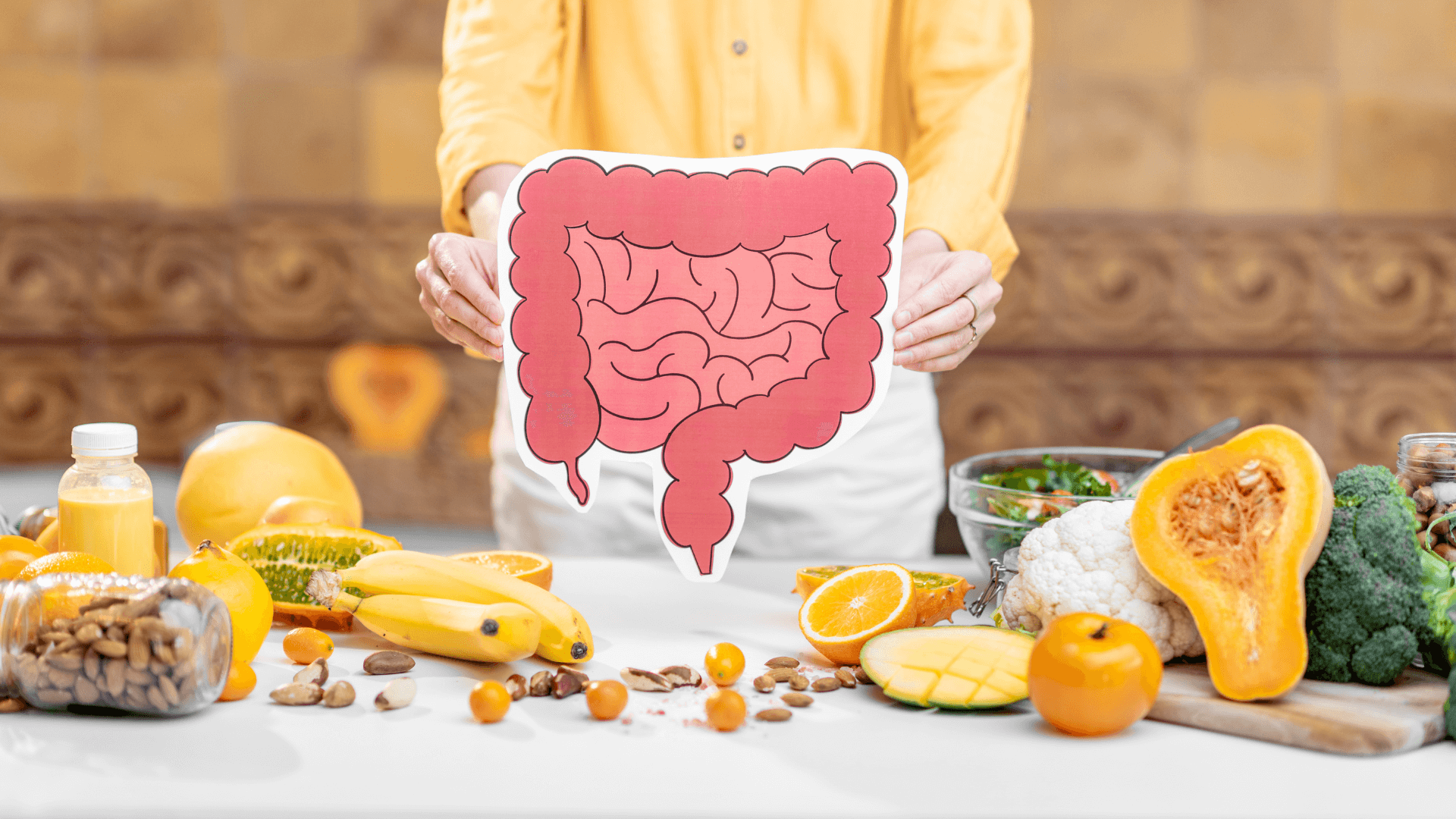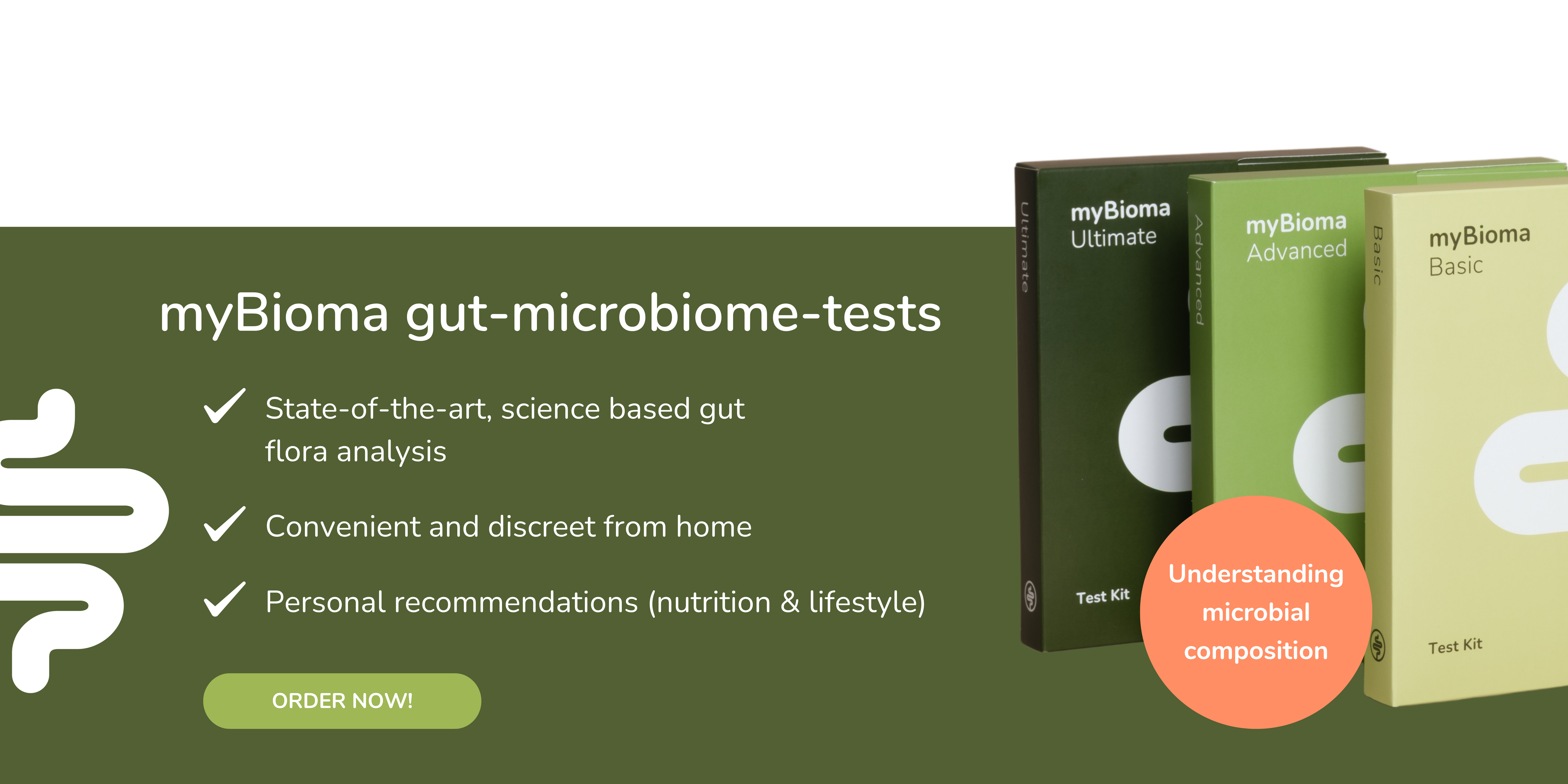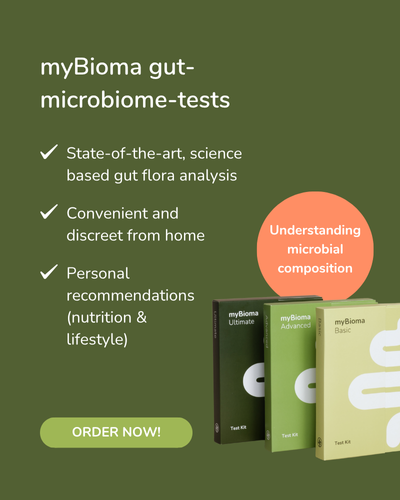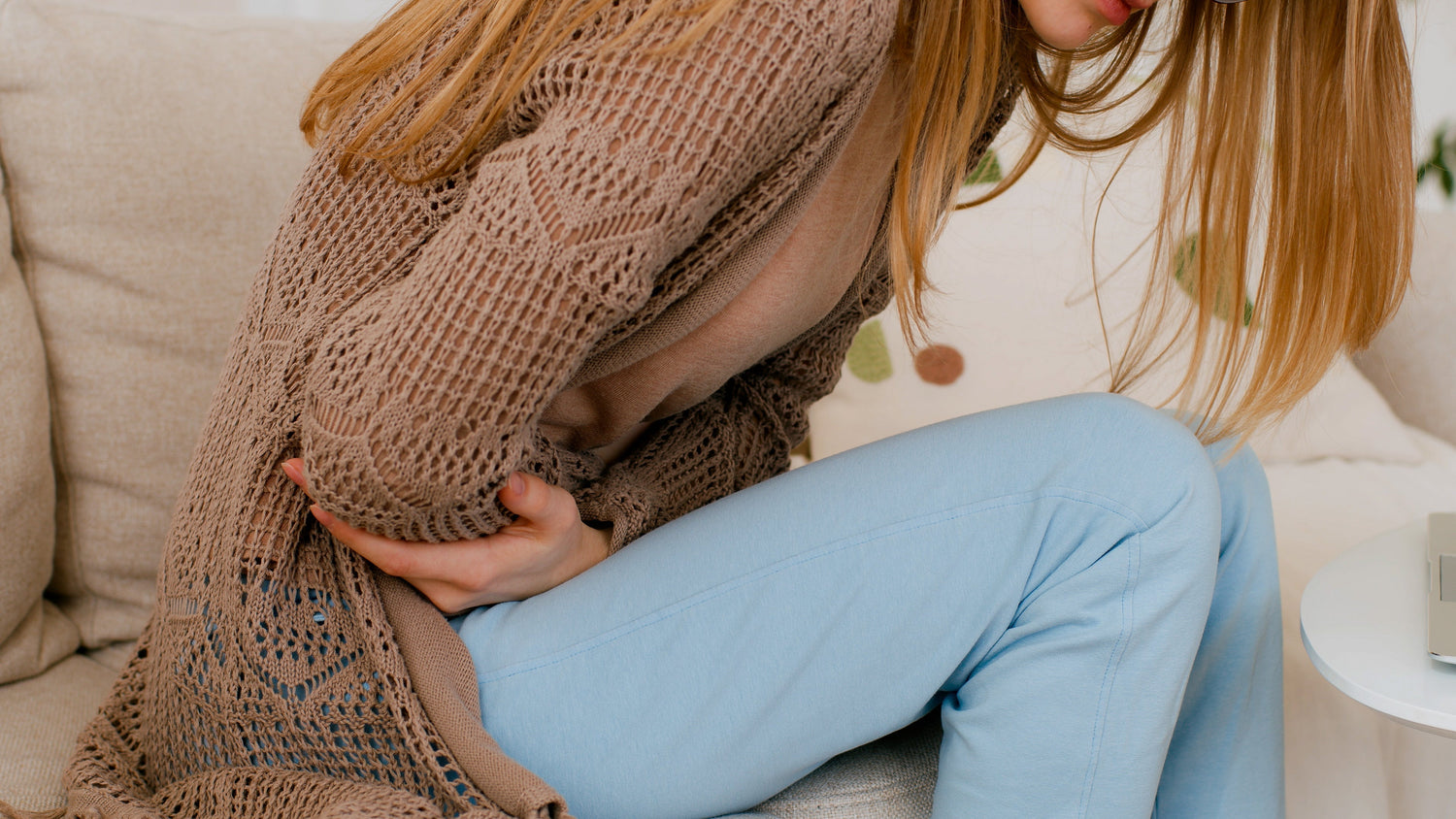Table of contents
Healthy digestion is the basis for our well-being - but many of us know the unpleasant feeling of sluggish digestion: bloating, a feeling of fullness or even constipation can have a major impact on everyday life. But what really helps to get digestion moving again?
In this article, we will show you simple but effective methods to stimulate your digestion naturally or to prevent digestive problems. With small changes in your diet, exercise and relaxation, you can stimulate your digestive system and feel better again.
Causes of digestive problems
Digestive problems can be caused by various factors. The following aspects often play a role:
The Western diet: Is characterized by a high consumption of processed meat, lots of sugar and unhealthy fats and is very low in fibre. This can have a negative effect on digestion (1). The low fibre content in particular often leads to digestive problems.
An imbalance in the intestinal microbiome: The gut microbiome, also called intestinal flora, comprises several trillion microorganisms - mainly bacteria that are located in our intestines and support the human organism in many important bodily functions, such as digestion. However, if the intestinal flora becomes imbalanced, also known as dysbiosis, it can lead to various complaints such as flatulence, diarrhea , bloating and a feeling of fullness as well as constipation (2).
Lack of exercise: A sedentary lifestyle reduces blood flow to the intestines and slows down bowel movements. This leads to slow digestion and less rapid transport of food through the gastrointestinal tract (3).
Stress: Stress hormones such as adrenaline can also lead to sluggish digestion. When adrenaline is released under stress, blood is directed primarily to vital organs such as the heart, brain and lungs. Less blood is then in the intestines and the digestive process is greatly reduced. The result is often constipation, bloating and abdominal pain (4).
When we are stressed, we also tend to choose unhealthy foods , sleep less , neglect exercise and often forget to drink enough (4).
Not drinking enough fluids: Sufficient fluid intake helps keep the stool soft and flexible, making it easier for food to move through the intestines. Additionally, drinking enough fluids encourages the production of saliva, which contains enzymes that kick-start carbohydrate digestion and assist with the overall digestive process (4).
Medications: Taking medications can also cause digestive problems or slow down digestion. Painkillers, antispasmodics and antidepressants, among others, can cause constipation (1).
Ignoring the urge to go to the toilet (4): If we do not act on the urge to go to the toilet, the stool remains in the intestine and water is increasingly removed, which can lead to hardening of the stool and constipation. Regularly ignoring the urge to go to the toilet can weaken the defecation reflex, making the sensation of needing to go less noticeable over time.

Digestive problems can have many causes.
Tips to stimulate digestion: eating habits and digestive-boosting foods
Dietary fibre:
Dietary fibre is plant fibre that cannot be digested by our body. However, it is crucial for healthy digestion because it:
- Stimulates bowel movement
- Feeds helpful bacteria in our gut
- Improves stool consistency
A distinction is made between soluble and insoluble fibre, both of which fulfil a slightly different function.
|
Type |
Function |
Food sources |
|
Soluble fibre |
Swell in the intestine, improve stool consistency & feed health-promoting gut bacteria, which, among other things, convert plant fibres into anti-inflammatory, short-chain fatty acids (SCFA). |
Oats, legumes, apples, carrots, linseed, psyllium husks |
|
Insoluble fibre |
Increase stool volume and accelerate the transport of food through the intestines. |
Whole grain products, nuts, vegetables, wheat bran |
High-fibre foods: whole grains, complex carbohydrates (such as oats, quinoa or brown rice), nuts, legumes, fruits and vegetables .
Ideally, we should consume around 30g of fibre daily to support our digestion (1,5). However, in the Western diet, the average intake is often only 12-15g per day.
Tips for a high-fibre diet
✔ Breakfast: Oatmeal with flax seeds & berries
✔ Snack: Handful of nuts or vegetable sticks
✔ Lunch/Dinner: Integrate whole grain products & legumes
Fermented foods:
Fermented foods contain live, probiotic bacteria . Regular consumption of fermented foods can support the intestinal flora, promote digestion and prevent flatulence and constipation.
When buying fermented foods, make sure that they are unpasteurized, meaning they haven't been heat-treated. Pasteurization would kill the living bacteria and thus reduce their health-promoting effects.
Fermented foods include: sauerkraut, kimchi , miso, apple cider vinegar, kombucha , bread drink, yogurt and kefir .
Our tip: A daily portion of fermented foods, such as a spoonful of sauerkraut, yogurt at breakfast or a glass of kefir, can provide long-term support for digestion.
Spices: The natural digestive aids (6):
The following spices are natural home remedies that can be easily integrated into your everyday life and support your digestion:
🌶️ Chili & Ginger
✔ Contains capsaicin (chili) & gingerol ( ginger ), which stimulate digestion
✔ Promote the production of bile acids & pancreatic enzymes → faster digestion
✔ Increase saliva production → supports food decomposition
How to take: Fresh or dried in meals
🌿 Fennel
✔ Contains anethole & essential oils → soothing & antispasmodic
✔ Stimulates gastric and intestinal juice secretion → less flatulence, shorter transit time of the food pulp
✔ Supports the intestinal flora → promotes healthy digestion
How to take: As a tea or spice in meals
🍃 Mint
✔ Antispasmodic & anti-inflammatory → relaxes the intestinal muscles
✔ Relieves bloating & feeling of fullness
✔ Promotes the production of digestive juices
How to take: Tea made from fresh or dried leaves
🌰 Nutmeg
✔ Relaxes the intestinal muscles & reduces gas formation
✔ Helps against flatulence, nausea & stomach problems
✔ Traditionally used as a powder with rice against diarrhea & colic
How to take: As a powder in food or nutmeg oil
🟡 Turmeric
✔ Contains curcumin → stimulates bile & enzyme production → supports fat digestion
✔ Anti-inflammatory → helpful for irritable bowel syndrome & stomach problems
How to take: As a spice (dried, in powder form) or tea
Sufficient fluid:
For good digestion, the body needs sufficient fluid, which stimulates intestinal movement, the production of digestive juices and facilitates the transport of food through the gastrointestinal tract .
Make sure to drink 1.5 to 3 liters of water or unsweetened tea daily (1,4,5).
Our tip: Warm lemon water in the morning: A large glass of water can stimulate bowel movements after the fasting phase at night. The warmth promotes blood circulation in the digestive organs and relaxes the stomach and intestinal muscles. This makes digestion easier and can relieve bloating or stomach pain. The lemon juice can promote the secretion of gastric juices and speed up stomach emptying, thus supporting digestion (7).
Avoid alcohol, cigarettes and fatty foods:
Alcohol and fatty foods slow down stomach emptying. This can lead to bloating, a feeling of fullness or constipation (4).
Therefore, drinking a shot after a meal is not recommended. Instead of stimulating digestion, it slows down digestion and can make symptoms worse.
Cigarettes reduce blood flow in the digestive tract and slow down bowel movement. This can also contribute to sluggish digestion (4).
Lifestyle and digestion
Movement and exercise:
Most people probably know that regular exercise is important for general health. But even if you have slow digestion, exercise and moderate training can do wonders. Exercise promotes digestion by:
- Stimulating intestinal motility
- Improving blood flow to the intestines
- Positively influencing gut flora
Aerobic activities such as walking, cycling and jogging in particular increase intestinal movement and reduce the time that food remains in the intestines. About 180 minutes of moderate exercise per week can reduce bloating, pain and discomfort. In addition, regular exercise promotes a more diverse gut microbiome, an important characteristic of healthy gut flora (1,3,5).
Tip: To prevent exercise-related digestive problems such as nausea, vomiting, stomach pain or diarrhea, avoid eating foods that are difficult to digest in the period before training. These include proteins, high-fat and high-fiber foods and dairy products (3).
Small movements:
- Take the stairs instead of the elevator.
- Make phone calls while standing or walking.
- Arrange to go for a walk with friends or family - a perfect opportunity for good conversation and lasting relaxation.
- Get off one stop early and walk the rest of the way or park your car one street away.
- Try new sports classes that are fun: aqua-zumba, a dance class, Pilates, bouldering, join a running club, learn to crawl, volleyball, judo,...
- Build small, active moments into your everyday life: do 10 squats, 10 jumping jacks, 10 sit-ups, 10 high knees,…
Reduce stress:
Relaxation techniques such as yoga , stretching or breathing exercises can help you reduce stress and relieve tension in the abdominal area. This can lead to improved digestion (3,4).
Regularly integrate small moments of relaxation into your day:
- Take 20-30 mindful breaths without distraction. You can close your eyes or lie on your back and breathe actively into your stomach.
- Do yoga or stretch for 10-15 minutes after you wake up or before you go to bed. You can also use guided videos from YouTube.
- A warm shower or a sauna session can provide lasting relaxation.
- Make yourself a cup of tea and drink it in silence without distraction. Try to mindfully notice how the tea tastes, how it smells, watch the steam rising.
- Sensory meditation: Sit comfortably. What are 5 things you see right now? What are 5 things you hear right now? What are 5 things you feel right now? What are 5 things you smell right now?
The correct sitting position when defecating
Sitting correctly on the toilet can make bowel movements much easier. In a squatting position, the natural bend between the rectum and anus opens, making emptying gentler and requiring less pressure. Since most toilets are not designed for this position, here are some tips to optimize your sitting position:
✅ Simulate a squatting position: Place a small stool under your feet so that your knees are above hip height. This will align the bowels optimally and make emptying easier.
✅ Lean your upper body slightly forward: This position supports the natural bowel movement and reduces the pressure during bowel movements.
✅ Relax instead of straining: Avoid straining too much as this can lead to hemorrhoids. Breathe deeply into your stomach and give your body time.
✅ Don't sit for too long: If it doesn't work right away, stand up and move around a bit to stimulate bowel activity.

Good digestion can be supported with small lifestyle and dietary changes.
SOS home remedies to quickly stimulate digestion
With these natural home remedies you can quickly get your intestines moving!
Drinks for better digestion:
🍹 Sauerkraut juice & apple cider vinegar
✔ Promote intestinal movement through probiotic bacteria and acids that stimulate digestive juices.
How to take:
- Drink 1 small glass (approx. 100 ml) of sauerkraut juice in the morning on an empty stomach.
- Drink 1 tablespoon of apple cider vinegar in a glass of lukewarm water before meals.
🥃 Plum juice
✔ Contains natural sorbitols that draw water into the intestines and soften the stool.
How to take:
- Drink 1 glass (approx. 200 ml) of plum juice in the morning or evening.
☕️ Coffee
✔ May stimulate bowel movement in the short term, but excessive consumption may cause constipation.
How to take:
- 1 cup of coffee in the morning can help stimulate digestion.
High-fibre foods:
🥜 Flaxseed, psyllium husks & bran (8.9)
✔ These swelling fibres bind water and facilitate bowel movements.
How to take:
- Stir 1 tablespoon of flaxseed or psyllium husks into 1 glass of water or yoghurt.
- Important: Always drink 2-3 additional glasses of water!
🥝 Kiwis (8)
✔ Improve stool consistency and help against flatulence.
How to take:
- 1-2 kiwis per day, ideally in the morning on an empty stomach.
Natural laxatives:
🍑 Dried plums & figs (8.9)
✔ Contain fibre and natural sugars that gently stimulate the intestines.
How to take:
- Soak 3-5 dried plums or figs in water overnight and eat in the morning.
🥛 milk sugar (lactose)
✔ Has an osmotic effect, draws water into the intestine and softens the stool.
How to take:
- Dissolve 1 teaspoon of lactose in warm water or tea and drink.
Tip: You will achieve the best effect through a combination of fibre, probiotic foods and sufficient fluids!
🫲 Abdominal massage
✔ Can stimulate digestion and relieve flatulence by promoting bowel movement.
Here's how it's done:
- Lie down comfortably – it is best to lie on your back and relax.
- Massage clockwise – With flat hands and gentle pressure, make circular movements around the belly button, always in a clockwise direction, as this corresponds to the natural movement of the intestines.
- Work slowly – gradually make the circles larger and apply gentle pressure.
- Repeat several times – perform the massage for 5-10 minutes.

Proven home remedies to stimulate digestion.
Special life situations and digestion
Digestive support when traveling:
Travel, time differences and an unfamiliar diet can disrupt digestion. Lack of exercise, lack of fluids and a diet low in fibre can all contribute to constipation when travelling.
- Make yourself a small travel pack with some flaxseeds or psyllium husks and dried plums for emergencies. You can also incorporate the flaxseeds and psyllium husks into your meals while on vacation to prevent sluggish digestion.
- Make sure to drink enough, especially in hotter areas. Fluid requirements may be a little higher here, at 3-4L per day.
- Try to maintain your routines : regular walks, a warm glass of water in the morning,…
Digestion during pregnancy:
Digestive problems, especially constipation, are common during pregnancy and affect up to 38% of pregnant women. The increased progesterone level slows down bowel movement and increases water absorption in the intestine, making stool passage more difficult (5,10). In addition, the gut microbiome also changes during pregnancy, which also can contribute to the development of digestive problems.
Studies show that probiotic preparations containing Bifidobacterium and Lactobacillus strains can relieve symptoms such as abdominal pain, constipation and bloating. Selected probiotics could therefore be a promising support for intestinal health during pregnancy. However, further research is needed (10).
- Make sure to include fermented (probiotic) foods in your meals on a regular basis.
- Eat several small meals instead of 2-3 large ones. This can ease the burden on digestion.
- Eat a variety of different, fiber-rich foods (various legumes, vegetables, amaranth, millet, whole wheat pasta)
Digestion and Aging:
As we age, digestion often slows down due to medication, lower energy intake, and less exercise. In addition, weakened abdominal and pelvic floor muscles can make it difficult to pass stool (5). Therefore, try the following:
- Eat fibre-rich foods.
- Prefer solid foods when possible to stimulate intestinal activity.
- Exercise regularly, including gentle abdominal and pelvic floor exercises.
- Regularly incorporate probiotic foods into your diet.
- Drink enough fluids.
The role of the gut microbiome in sluggish digestion
An imbalance in the intestinal flora can cause constipation. Beneficial bacteria promote intestinal movement, help break down fibre, and produce short-chain fatty acids that stimulate intestinal muscles. A lack of these bacteria or an overgrowth of unfavorable microorganisms can slow down intestinal movement and make stool passage more difficult .
A low-fibre or unbalanced diet, stress and lack of exercise are factors that can damage your intestinal flora. To support your health-promoting gut tractmates, eat fibre, regularly include fermented (probiotic) foods in your diet and make sure you get enough exercise, good sleep and moments of relaxation.
You can find out how healthy your gut microbiome is with the myBioma gut microbiome test!
When to see a doctor?
If your symptoms persist despite changes in diet and lifestyle, we recommend that you consult a doctor .
If you experience warning signs such as severe pain or blood in your stool, you should not wait long and have the symptoms checked by a doctor.
As you can see, with small changes in your lifestyle, diet, and stress management, you can naturally boost your digestion and prevent issues like bloating and constipation. And if things do get stuck, tried-and-tested home remedies offer gentle support.
References
- Manisha M. (2021). Gastrointestinal disorders and its complications. Int J Probiotics and Dietetics 1(1): 6-12.
- Banaszak, M., Górna, I., Woźniak, D., Przysławski, J., & Drzymała-Czyż, S. (2023). Association between Gut Dysbiosis and the Occurrence of SIBO, LIBO, SIFO and IMO. Microorganisms, 11(3), 573. https://doi.org/10.3390/microorganisms11030573
- Zabawa, B., Sadowski, J., Mól, P., Papież, Ł. S., Dołęga, J., Krzykawski, K., Maciejczyk, T., Sieńko, A., Łabuś, M., & Hudzińska, P. (2024). Impact of Physical Activity on Digestive System Diseases. Quality in Sport, 34, 56112. https://doi.org/10.12775/QS.2024.34.56112
- Deep, D.B. (2021). STRESS AND CONSTIPATION (VIBANDHA)—CRITICAL REVIEW. Ayurline: International Journal of Research in Indian Medicine, 5(04). https://doi.org/10.52482/ayurline.v5i04.569
- Yurtdaş, G., Acar-Tek, N., Akbulut, G., Cemali, Ö., Arslan, N., Beyaz Coşkun, A., & Zengin, FH (2020). Risk Factors for Constipation in Adults: A Cross-Sectional Study. Journal of the American College of Nutrition, 39(8), 713-719. https://doi.org/10.1080/07315724.2020.1727380
- Shrey, P. (2022). A REVIEW ON DIGESTIVE STIMULANT HERBS USED FOR IRRITABLE BOWEL SYNDROME. International Journal of Biology, Pharmacy and Allied Sciences, 11(12). https://doi.org/10.31032/IJBPAS/2022/11.12.6665
- Freitas, D., Boué, F., Benallaoua, M., Airinei, G., Benamouzig, R., Lutton, E., Jourdain, L., Dubuisson, R.-M., Maître, X., Darrasse, L., & Le Feunteun, S. (2022). Glycemic response, satiety, gastric secretions and emptying after bread consumption with water, tea or lemon juice: A randomized crossover intervention using MRI. European Journal of Nutrition, 61(3), 1621-1636. https://doi.org/10.1007/s00394-021-02762-2
- Chey, SW, Chey, WD, Jackson, K., & Eswaran, S. (2021). Exploratory Comparative Effectiveness Trial of Green Kiwifruit, Psyllium, or Prunes in US Patients With Chronic Constipation. American Journal of Gastroenterology, 116(6), 1304-1312. https://doi.org/10.14309/ajg.0000000000001149
- Abbasalizadeh, S., Ebrahimi, B., Azizi, A., Dargahi, R., Tayebali, M., Ghadim, ST, Foroumandi, E., Aliasghari, F., Javadi, M., Izadi, A., Banifatemeh , L., Pourjafar, H., Khalili, L., Ghalichi, F., Houshmandi, S., & Rad, AH (2020). Review of Constipation Treatment Methods with Emphasis on Laxative Foods. Current Nutrition & Food Science, 16(5), 675-688. https://doi.org/10.2174/1573401315666191002164336
- Liu, Z.-Z., Sun, J.-H., & Wang, W.-J. (2022). Gut microbiota in gastrointestinal diseases during pregnancy. World Journal of Clinical Cases, 10(10), 2976-2989. https://doi.org/10.12998/wjcc.v10.i10.2976








2 comments
Hi Mechtilde,
Histamin befindet sich vermehrt in lange gereiften und fermentierten Lebensmitteln. Meide daher Produkte wie reifen Käse, Salami, Sauerkraut, Sojasauce und Rotwein und setze auf frische, unverarbeitete Lebensmittel. Auch bestimmte Lebensmittel wie Zitrusfrüchte, Erdbeeren, Tomaten und Ananas können Beschwerden auslösen. Hol dir am besten Unterstützung von einer Ernährungsfachkraft, um die ideale Ernährungsweise für dich zu finden. Übrigens kann auch Stress die Histaminausschüttung im Körper triggern – achte also gut auf dich!
Alles Gute und liebe Grüße
Carina von myBioma
Habt ihr Tipps zur Ernährung bei Histaminintoleranz?